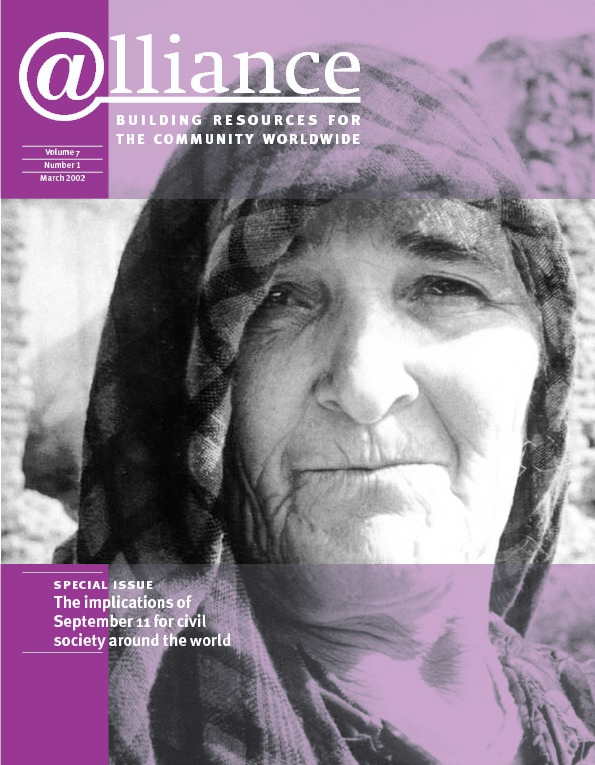‘The major challenges of September 11 are to rediscover core values or first principles, and learn how to embrace or handle or confront change and uncertainty.’ So said Mott Foundation President and CEO Bill White in a keynote address to the Independent Sector conference in November.[1] ‘How well are we doing?’ he asked his audience – and went on to pose a series of ‘challenges’ or questions to all US non-profits.
“One, we in the non-profit sector have portrayed ourselves as the champions of the poor, the disenfranchised, and the oppressed. We have claimed our position as defenders of their rights, as advocates for enabling and supportive policies in the fields of welfare reform, education, and health. However, have we delivered on our promises? More importantly, have we listened to the people? Have we facilitated their involvement as partners in helping solve the problems they face?
Two, there is now an even greater need for us to address issues of diversity and to work together for tolerance and understanding. Do we devote sufficient resources in the form of time, energy, and money to promoting understanding? Are we too quick to judge people’s customs, habits, and cultural norms when they are different from our own? More importantly, are we prepared to support and defend diversity and to work to eradicate racism, as we advocate for every voice to be heard?
Three, earlier I referred to the notion of partnership. The independent sector, broadly defined, cannot do everything on its own. Well, neither can government and the corporate sector. And we also need to include the media. To move forward, all facets of society need to work together. So how do we maximize our combined resources? Do we seek opportunities to work together? Do we seek to understand how each other works?
Four, there are not enough foundations, non-profit organizations, educational institutions, and other organizations, again in the broadly defined third sector, with a global perspective. Transformational leadership requires informed debate and dialogue on foreign policy issues and understanding of strategic global concerns. … For example, we need to bring a global awareness to our local cultural institutes and our local educational systems. …
Five – now we’re getting down to the basics – ‘stick to your knitting.’ It is a phrase used by Tom Peters and his colleagues as a successful management strategy. It applies to our sector now. We need to ask: are our management structures appropriate for today and tomorrow’s needs? Do we have strong, engaged boards and competent, committed, and compassionate staff? Are we running cost-efficient operations? Are we transparent and accountable? Are we sufficiently aware of our constituents and their needs? Are those the needs we respond to? …
Six, are all aware we face economic challenges? Many foundations, non-profit organizations, and other sector institutions have experienced reductions in their revenues and assets. At the same time this is a very wealthy country, both in terms of the voluntary spirit and also money. I believe one’s charitable impulse has to hit the pavement on Main Street because that is where people’s lives are played out. … While we are in an economic recession, there should never be a recession of the human spirit. …
For those of us in the foundation world, we need to honour our commitments. We need to tighten our own belts and we need to be more targeted on the critical issues of the day, particularly poverty, racism, and illiteracy. We also need to take a long view, perhaps a rolling average approach, to our spending policies. Perhaps during this period we should, when appropriate, favour general purposes grants as opposed to more directed philanthropy. That provides a little more flexibility. But, most important, both donors and donees need to build real partnerships based on listening and trust.
Seven, … Perhaps the greatest scourge of all is that of illiteracy and the lack of educational opportunity and, yes, access. We know with absolute certainty that those who do not have a solid education have little chance of success in our world … Further, we all know that the results of poor academic achievement and illiteracy for many mean unrealized potential and a downward spiral of crime, drug addiction, poverty, homelessness, extreme marginalization, and in many cases intolerance. Recent studies show that in the United States, 14 per cent of children leave school each year before the minimum school leaving age. … It’s unacceptable.
And I have also just described a good breeding ground for hatred and fanaticism. Our challenge is to address not only the external threats to America, but also the internal threats.”
1 The conference theme: ‘Let Every Voice Be Heard: The Responsibility of Leadership.’ Bill White’s speech was entitled ‘The Challenge of Nonprofit Leadership: Building a Transformed World’.
For the full text of the speech, please visit the C S Mott Foundation’s website at http://www.mott.org or the Independent Sector website at http://www.independentsector.org


Comments (0)